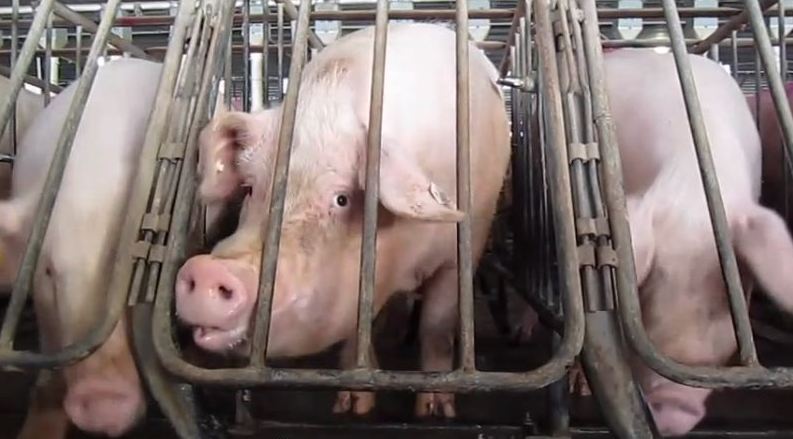Proposition 12: A National Debate
Humane Society of the United States, CC BY 3.0
Smithfield Foods gestation crates, Smithfield Foods/Murphy Brown pig breeding facility, Waverly, Virginia, United States.
A New Law Emerges
On January 1, 2022, in the state of California, Proposition 12 was enacted. It was voted on by the people of California in 2018. This new law prohibits the housing of sows, or pregnant pigs, in small crates during their pregnancy in which they do not have space to move. These small crates, usually known as gestation crates, measure approximately 6.6 ft. x 2.0 ft. These cages prevent the pregnant pigs from turning around, laying down or getting up, and even stretching their legs. Under the new law, spaces for sows should be at least 24 square feet — 8 more square feet than the previous standard.
In the Life of a Sow
The pork industry is meticulous when it comes to how they use their pigs. According to the American Meat Science Association, sows can have at most three litters per year. When a sow is expecting, she is kept in a gestation crate. After the birth of a litter, the sow and her piglets are brought to a farrowing crate where newborn piglets suckle through slats in the cage, and the mother is kept on her side in a closed off part of the cage, separating her from her piglets. When three weeks have passed, the piglets are removed and the sow is impregnated again. This procedure is followed through until the sow is about three or four years old. At this point, she is slaughtered and her meat is harvested.
Dispute Among the People
There is some controversy around its power over the pork industry. Most companies are not ready for these new standards to take place. According to National Geographic, only 4% of America’s pork producers currently meet the law’s criteria of 24 square feet per sow. And though animal welfare activists are celebrating this great step forward in improving the lives of the animals, trade groups have gone so far as to bring this new law to court. So far, the federal court has sided with the Californians, saying that the law is valid because people have the right to vote for new laws.
Though some pork farmers say they will comply with the new law, National Geographic says that the meat industry has been responding to the law with hostility. Pig farms in other states will have to upgrade their pig’s living conditions if they want to sell their pork to California — even if some of their pork ends up being sold to other states. This will lead to a loss of profit for the pork industry nationwide.
Lastly, the new law will cause prices all over the United States to rise; even though the people of other states didn’t vote for nor agree to these new conditions, pork products will become harder to afford for everyone.
A Ripple of Reform
Other related laws have previously been passed; there are bans on gestation crates in ten states across the US , and in 2016, Massachusetts banned the selling of eggs laid by hens kept in cages.
Proposition 12, or the California Pig Law, will vastly change the lives of pigs around the country. Sows will never again spend their expecting days in gestation crates. Together as a society, we are taking a step towards long awaited change. Animal welfare activists are hoping that this will spark a movement of revolution that may spread through the nation, and soon, and maybe even create a wave of equity throughout the whole world.






